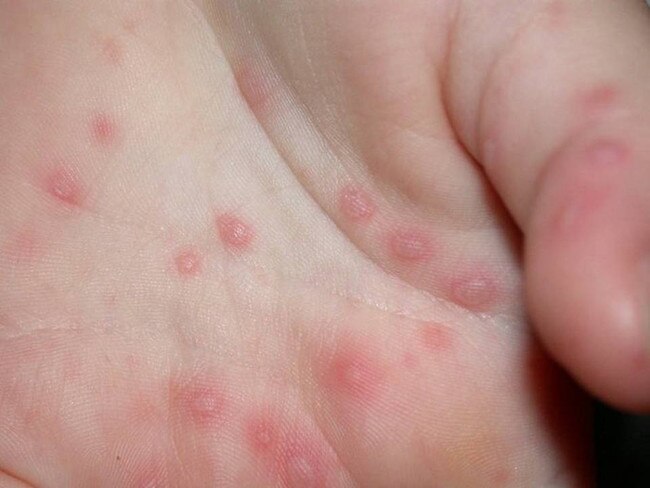The symptoms you need to know after hand, foot and mouth disease leaves toddler fighting for life
It’s the usually harmless disease that has left one Queensland toddler fighting for life in hospital. Experts have explained the symptoms all parents need to know when deciding whether hospital is required.

QLD News
Don't miss out on the headlines from QLD News. Followed categories will be added to My News.
The usually harmless hand, foot and mouth disease that spreads quickly, typically among daycare aged children has left one Queensland toddler fighting for life in hospital.
Zara Mulheran, who battles a variety of health conditions daily, tested positive for hand, foot and mouth disease on February 23. A month later she was on life support following two cardiac arrests at Queensland Children’s Hospital.
According to Queensland Health, hand foot and mouth disease is “usually a mild illness that occurs in mainly young children, but can also affect older children and adults”.
Experts have revealed some of the symptoms parents can watch out for to know whether a trip to hospital is required, including rapid breathing, trouble walking or persistent fever.

It is caused by a number of different enteroviruses, particularly coxsakieviruses, and people can be infected with the virus but not develop a symptoms of the disease.
Outbreaks of hand, foot and mouth disease can occur frequently among groups of children such as in child care centres.
Outbreaks of the disease are not notifiable under the Public Health Act.
While the majority of hand, foot and mouth cases are very common and typically mild, there are six symptoms public health authorities say are signs of a more serious infection that should be seen to immediately:
- Persistent fever (38C or above for 72 hours of more)
- Abnormal movements/jerking movements
- Rapid breathing
- Excessive tiredness, drowsiness
- Excessive irritability
- Difficulty walking

Infectious disease expert Paul Griffiths said Zara’s case is “extremely rare” and for almost all infections, the virus runs over a short space of time with little to mild symptoms.
“Hand, foot and mouth disease is a viral infection and it is mainly transferred through saliva or other bodily fluids and for most people is very mild with the symptoms only staying around for a short space of time. Usually these symptoms aren't too much of a consequence as well,” Dr Griffiths said.
“Occasionally mild viral infections can be more significant and cause something like this but those cases are extremely rare.”
According to Ms Mulheran, Zara’s mother, her daughter did not display the normal rash associated with hand, foot and mouth disease that she was used to seeing in her other four children.

“The rash is of course the most typical presentation of the disease but in the majority of cases the rash doesn't have to appear at all or you might only get a small rash in one of the areas,” Dr Griffith said.
“Hand, foot and mouth cases can spike periodically and usually coincide with environmental conditions, at the moment it is not a typical time it is usually around the warmer months and back to school time.
“The important thing is something as transmissible as hand, foot and mouth disease is to bring awareness so we can reduce the transmission. If your child is sick make sure they stay home and exercise basis hand hygiene.”
Hand, foot and mouth disease is can most effectively be prevented by good hygiene with Queensland Health advising the public to wash hands with soup and water, avoid sharing cups and utensils and to stay home while infected.
There is no cure or vaccine for hand, foot and mouth disease, but the infection is most commonly treated with paracetamol to relieve fever.





